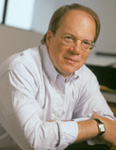
Vol. 77, No. 9, September
2004
By the Numbers
Every 10 years the State Bar
must submit to the Wisconsin Supreme Court a reapportionment plan FOR
its 16 Board of Governors districts. The Board considers locational and
other statistics to create a fair plan for member
representation.
by
State Bar executive director
 Quite
often
I am asked, "Just how many attorneys are there in Wisconsin?"
And, "Where are they?"
Quite
often
I am asked, "Just how many attorneys are there in Wisconsin?"
And, "Where are they?"
As of July 1, 2004, there were 21,518 Wisconsin-licensed attorneys.
Five years ago, the number was 19,984 and five years before that it was
17,974 attorneys. That is a 20 percent increase in the number of
attorneys
in 10 years.
Today, 6,581, or 30.5 percent of the total membership of Wisconsin
attorneys
live and work outside of the state. Five years ago, 29.6 percent were
nonresident members and in 1994, 28.5 percent held the same status.
While the number of nonresident lawyers has increased at a slightly
faster rate than the total number of members, the number of women
lawyers
has increased dramatically. In 1994, 4,043 members (about 22.5 percent)
were women. By 1999, the percentage had grown to 26 percent, and today
the number is 6,197, or 28.8 percent. These numbers belie the trend
toward
even greater numbers of women practicing in the profession. A breakdown
by age reveals that only 8 percent of the lawyers age 60 and older are
women. This percentage grows dramatically as we look at younger ages.
For lawyers age 50 to 59, 21 percent are women, for age 40-49, it is 34
percent, for age 30-39, it is 41 percent, and for lawyers up to age 29,
49 percent are women.
It is no surprise that the greatest number of lawyers have their
offices
in Milwaukee. At 5,095, this one county alone holds 34 percent of the
Wisconsin resident lawyers. When you add in the greater Milwaukee area
counties of Waukesha, Racine, Kenosha, Washington, and Ozaukee, you have
7,287 or 49 percent of all the lawyers in the state. Dane County has the
second largest number of lawyers at 3,132, or 21 percent of the in-state
lawyers. Waukesha is a distant third at 1,212, followed by Brown,
Racine,
and Outagamie counties. Florence County has the fewest attorneys, with
only two, which is down from three attorneys 10 years ago. Similarly,
the relative percentage of attorneys by county has stayed the same as
10 years ago, though some counties such as Waukesha have grown slightly
faster than the state as a whole.
In recent years, we have asked you to check up to three of 49 boxes
indicating your primary areas of practice on your membership statement.
Of those who filled in any boxes, 3,606 practice in the
business/corporate
field; 3,153 practice real property law; 2,826 practice criminal law;
and 2,818 practice in torts/personal injury law. Family law is fifth,
with 2,370 members practicing in this area. Only 14 lawyers practice in
admiralty/maritime law, 52 in transportation, and 68 in civil procedure.
In the Dairy State, only 87 lawyers specifically practice agriculture
law.
This year, the Board of Governors must submit to the Wisconsin
Supreme
Court a plan for reapportionment of its 16 Board of Governors districts.
While not concerned about practice area or gender, the committee working
on this issue will be using these and other locational statistics to
create
the best possible apportionment plan so that you will have the fairest
chance to have your voice heard in the making of State Bar policy.
The 49 members of the Board are your representatives who debate and
decide State Bar policy. In the near future, the Board will be deciding
the State Bar's positions on such significant issues as the petition
submitted
by the Wisconsin Trust Account Foundation to the Wisconsin Supreme Court
requesting a $50 annual mandatory fee from all attorneys that WisTAF
would
use to fund civil legal services to the indigent, and the proposed
Ethics
2000 rule changes that were submitted to the supreme court by the
court's
own Ethics 2000 Study Committee.
To contact your governor on these or other important issues before
the
State Bar, visit the Board
of Governors area on WisBar.
Wisconsin Lawyer
